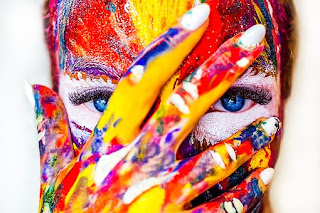***
Editor’s
Thoughts
***
CREATIVITY:
A SOUL-SPARKING PLAY
Jana Begovic
Almost
all creativity involves purposeful play. -Abraham Maslow
Throughout the ages, creativity has been the subject
of discussion of numerous philosophers, such as Plato and Aristotle,
psychologists and psychiatrists, such as Freud, Jung and Maslow, as well as
literary historians.
The beginnings of the philosophical thought in Greece
and India linked creativity to the divine. According to Plato, creativity is
the muse-inspired product, and without muses and their influence, there would
be no art. It was only as of the Renaissance that humans were affirmed as
creators who did not need God’s patronage.
Imagination has always had a significant place in the
understanding of the creative process. It is a boundless, untamed and magical
force that creates new, dream-like worlds, worlds that at the same time feel
real. It fuels the creative process, which itself lies on a continuum of
unconscious, semi-conscious or conscious processes.
According to Jung, a creatively endowed individual
does not decide whether he will create or not, rather he feels compelled to act
creatively. That individual is held captive by the mysterious and yet natural
creative power that simply exists and is hard to resist.
My own writing process feels like an encounter with the
mysterious and the divine. Where does this inspiration come from? Why did this
character decide not to go on this trip when I had clearly expected she would?
Why would she reveal such a deep secret to her husband and risk her marriage?
These are some of the rhetorical questions I have asked of myself. Or, when the
inspiration would ebb, and the storytelling would come to a screeching halt,
how did I know I should just let the story ferment and simmer in my
sub-conscious mind and the well of creativity would start bubbling
anew?
Mining our souls for the creative treasures they hide gives
us a vast playground. When writing is considered not only as a divine spark,
but also as play, the frustrations of writer’s block diminish or vanish, and we
begin to write for the sheer joy and exhilaration of honouring the divine spark
in us, and our instinct for play. In those moments, we think less about the
frustrations of marketing our work tending to accept rejections with more
equanimity, as well as the facts of the publishing game that only a small
percentage of authors actually strike gold and garner mega success.
By engaging in this magical and the mysterious process
writers, each in his/her singular way, continue to carry the torch of the fire
Prometheus stole from the gods to give humans the creative spark.
Jana Begovic is Guest Editor of Ariel Chart.


Like the new vibe.
ReplyDeleteJim